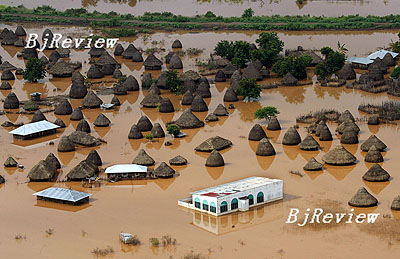
The UN Security Council held its first ever open debate on the impact of climate change on global security in mid-April, indicating the growing concern of the international community over the issue. However, Chen Ying, an associate researcher with the Center of Sustained Development under the Chinese Academy of Social Sciences, believes the UN Security Council is not an appropriate platform for such discussions.
Since the 1990s, a growing number of economic, institutional and political instruments have been introduced to deal with the environmental issue, including climate change. In response to economic losses possibly derived from climate change and economic costs required to alleviate the problem, the global carbon market has grown rapidly with the launch of such market-oriented measures as the emissions trading scheme and the clean development mechanism.
On the basis of the UN Framework Convention on Climate Change and the 1997 Kyoto Protocol on reducing greenhouse gas emission, the institutional construction in this field has made remarkable progress. At present, negotiations on post-Kyoto Protocol actions, which have a bearing on the international cooperation in response to climate change, are at a critical point. All countries involved are working hard to exert influence on the formation of an international climate change response mechanism in the post-Kyoto Protocol era.
More importantly, negotiations on the climate issue have become a prominent part of global politics. Attitudes toward climate change of countries participating in this process are expected to reshape their relations to some extent, major powers in particular.
Climate change poses a global issue, which may give rise to the scarcity of resources, immigration inflicted from deteriorating ecology and incremental pressure from society. The issue needs the efforts of all nations and the international community to tackle it seriously. Hence, the adoption of more positive economic, institutional and political countermeasures for this purpose is of great significance. It is vital to deal with climate change via international cooperation.
The primary duty of the UN Security Council, according to the UN Charter, is to safeguard global peace and security, whereas the issues relevant to economic and social development should be handled by the UN Economic and Social Council and the UN General Assembly. The demarcation line between traditional and nontraditional security issues has turned increasingly obscure along with the growing impact of nontraditional threats. Against this background, UN Security Council members are reasonable to hold discussions on issues such as climate change, in a bid to raise the awareness of the international community of major security threats expected to emerge in the years ahead. Even though, to cite climate change as a major concern to the UN Security Council will inevitably over-politicize the issue.
First, climate change is a global issue and all nations around the world are entitled to partake in the discussions as they are all victims of deteriorating weather. At present, the UN Security Council is operating under a mechanism with five permanent and 10 non-permanent members, but their representation is vulnerable.
Second, climate change is, in the final analysis, an issue of development. To integrate its solution with sustained development has been the consensus of the international community and the objective of long-term efforts. When some concrete measures are likely to cause immediate interest conflicts between countries involved, the adoption of compulsory means in this field would become counterproductive.
Third, the international cooperation on climate change requires not only professional knowledge but also the ability to make a comprehensive use of technological, financial, market and legal resources, which the UN Security Council apparently does not have.
Despite the tough and drawn-out post-Kyoto Protocol climate change negations, relevant international treaties remain the cornerstone for their future success. Any multilateral mechanism outside the United Nations, such as the Global Economic Forum and G8 meeting, can only play a supplementary role. |
